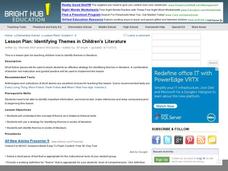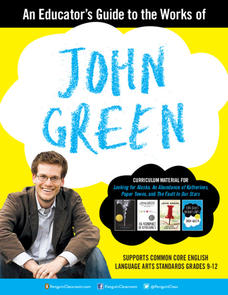Curated OER
Town Hall: comprehension skills
In this comprehension skills worksheet, learners read the book Town Hall and complete comprehension activities. Students complete 5 activities including synthesizing, main idea/details, making inferences, and drawing conclusions.
Curated OER
Henry and Mudge: comprehension skills
In this comprehension skills worksheet, learners read the book Henry and Mudge and complete comprehension activities. Students complete activities such as inferences, drawing conclusions, character traits, and main idea and details.
Curated OER
Drawing Conclusions
Tenth graders explore why some teenagers take unnecessary risks. In this decision making lesson, 10th graders read an article on risk taking and draw important conclusions on the topic.
Curated OER
Predict, Draw Conclusions
Learners discuss times they predict what will happen next. They compare this to using the information given in a piece of literature to predict what will happen next in the story. Students listen as the teacher reads an excerpt from The...
College Board
Teaching Students How to Write AP Statistics Exam Responses
But this is math—we don't need to know how to write! The article makes a point that class members in AP® Statistics should be comfortable writing as the exams require it. Individuals quickly realize that quality writing is crucial to a...
Curated OER
Identifying Themes in Children's Literature
Identifying themes in literature is the focus of the language arts lesson plan presented here. Learners read short pieces of fiction and practice the skill of identifying the themes present in each one. The bulk of the lesson consists of...
K5 Learning
The Fishhawk
Read about why the osprey is also known as the fishhawk in a short reading passage that describes where they live, what they eat, and what they look like. After reading, individuals respond to four short answer questions based on what...
Houghton Mifflin Harcourt
Down on the Farm: English Language Development Lessons (Theme 8)
Down on the Farm is the theme of this series of ESL lessons designed to support reading, speaking, and listening skills. Over three weeks, your learners will have the opportunity to sing songs, play guessing games, create masks, role...
Penguin Books
An Educator’s Guide to the Works of John Green
The novels of John Green cover the gamut of teenager emotions. A guide to his works provides classroom lesson plans for the novels Looking for Alaska, An Abundance of Katherines, The Fault in Our Stars, and Paper Towns. Each lesson...
Sunburst Visual Media
Clouds
Support science instruction with a combination of engaging activities and skills-based worksheets that focus on clouds. Learners take part in grand discussions, write an acrostic poem, complete graphic organizers, solve word puzzles, and...
Alabama Department of Archives and History
Strange Fruit: Lynching in America
To continue their study of the Civil War, Reconstruction, and the beginning of the civil rights movement, class members watch the YouTube video of Billie Holiday singing "Strange Fruit" as an introduction to an examination of lynching in...
Science 4 Inquiry
Enzymes in Action
Enzymes play a role in almost every function in the human body. Scholars explore three variables related to the use of enzymes. They observe a catalase reaction, experiment with substrates, and examine reactions rates.
Curated OER
Things Aren't Always What They Seem
Students use video and the Internet to make predictions, draw conclusions, determine conflict and point of view while reading a short story. In this short story analysis lesson plan, students watch a related video and complete a...
Curated OER
Explicit Information versus Drawing Conclusions
Third graders identify explicit information and draw conclusions from text. In this instructional lesson, 3rd graders review models of each question type (explicit and conclusion) and practice reading a passage to answer questions.
National Center for Case Study Teaching in Science
A Case Study of Memory Loss in Mice
Using a short news article, high school or college biologists examine the scientific method in practice. The article, which focuses on an Alzheimer's experiment performed on rats, has very limited information, so learners must be able to...
Curated OER
African American Life in the Nineteenth Century
Students read about the life and work of John and Mary Jones. Using primary source documents, they draw conclusions about their role in the abolistionist movement. They also examine artifacts from their lives and analyze their portrait...
Curated OER
Call It a Hunch
Give young scholars a chance to practice making inferences after reading the book Through My Eyes by Ruby Bridges. They confirm whether or not their conclusions are true, have a class discussion, and then independently complete an...
Scholastic
Follow the Clues
Invite your text detectives to bring their magnifying glasses to school to examine the clues in a text and make predictions. They write down three clues and a prediction on the graphic organizer.
Hampton-Brown
From "First Crossing"
Young scholars look closely at four tales taken from the collection of short stories, First Crossing edited by Donald R. Galloby. While examining the life of four teenagers and the lives they lead as U.S. immigrants, your enthusiastic...
Facing History and Ourselves
Why Little Things Are Big
Often our decisions are impacted by a fear of how others see us. That's the big idea in a two-day lesson that asks how false assumptions, how our fear of how others may see us, impact how we act. After watching a video about such a...
Curated OER
"I Can” Common Core! 6th Grade Reading
It is much easier for kids to know they have reached a goal when that goal is clearly defined. By providing sixth graders with a checklist of Common Core reading standards written in "I can" format, each child can keep track of his own...
Pennsylvania Department of Education
Analyzing Key Ideas and Details in Nonfiction
Students explore nonfiction texts. In this language arts lesson, students read a nonfiction text and make predictions. Students identify facts and opinions in the text and draw conclusions as they read.
Curated OER
The Gingerbread Boy Comes Alive
Students make cut-out gingerbread cookies. After reading "The Gingerbread Boy", their cookies "disappear" and students must make predictions and draw conclusions about what happened to their cookies.
Baylor College
Body Mass Index (BMI)
How do you calculate your Body Mass Index, and why is this information a valuable indicator of health? Class members discover not only what BMI is and practice calculating it using the height and weight of six fictitious individuals, but...

























